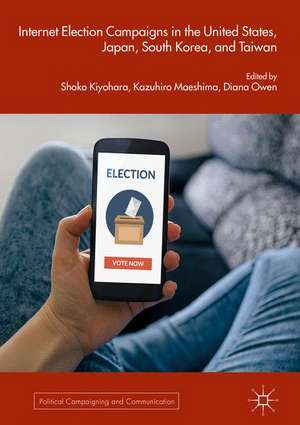Internet Election Campaigns in the United States, Japan, South Korea, and Taiwan: Political Campaigning and Communication
Editat de Shoko Kiyohara, Kazuhiro Maeshima, Diana Owenen Limba Engleză Hardback – 27 oct 2017
| Toate formatele și edițiile | Preț | Express |
|---|---|---|
| Paperback (1) | 635.47 lei 6-8 săpt. | |
| Springer International Publishing – 23 iun 2018 | 635.47 lei 6-8 săpt. | |
| Hardback (1) | 890.37 lei 6-8 săpt. | |
| Springer International Publishing – 27 oct 2017 | 890.37 lei 6-8 săpt. |
Din seria Political Campaigning and Communication
-
 Preț: 152.45 lei
Preț: 152.45 lei - 20%
 Preț: 690.35 lei
Preț: 690.35 lei -
 Preț: 353.61 lei
Preț: 353.61 lei - 18%
 Preț: 729.84 lei
Preț: 729.84 lei - 15%
 Preț: 695.85 lei
Preț: 695.85 lei - 15%
 Preț: 643.65 lei
Preț: 643.65 lei - 15%
 Preț: 586.23 lei
Preț: 586.23 lei - 18%
 Preț: 785.42 lei
Preț: 785.42 lei -
 Preț: 415.52 lei
Preț: 415.52 lei - 18%
 Preț: 780.19 lei
Preț: 780.19 lei - 18%
 Preț: 724.50 lei
Preț: 724.50 lei -
 Preț: 382.57 lei
Preț: 382.57 lei - 18%
 Preț: 890.23 lei
Preț: 890.23 lei - 18%
 Preț: 726.85 lei
Preț: 726.85 lei - 18%
 Preț: 895.58 lei
Preț: 895.58 lei - 18%
 Preț: 725.43 lei
Preț: 725.43 lei -
 Preț: 390.63 lei
Preț: 390.63 lei
Preț: 890.37 lei
Preț vechi: 1085.82 lei
-18% Nou
Puncte Express: 1336
Preț estimativ în valută:
170.37€ • 178.36$ • 140.97£
170.37€ • 178.36$ • 140.97£
Carte tipărită la comandă
Livrare economică 05-19 aprilie
Preluare comenzi: 021 569.72.76
Specificații
ISBN-13: 9783319636818
ISBN-10: 3319636812
Pagini: 212
Ilustrații: XV, 212 p. 7 illus., 5 illus. in color.
Dimensiuni: 148 x 210 mm
Greutate: 0.43 kg
Ediția:1st ed. 2018
Editura: Springer International Publishing
Colecția Palgrave Macmillan
Seria Political Campaigning and Communication
Locul publicării:Cham, Switzerland
ISBN-10: 3319636812
Pagini: 212
Ilustrații: XV, 212 p. 7 illus., 5 illus. in color.
Dimensiuni: 148 x 210 mm
Greutate: 0.43 kg
Ediția:1st ed. 2018
Editura: Springer International Publishing
Colecția Palgrave Macmillan
Seria Political Campaigning and Communication
Locul publicării:Cham, Switzerland
Cuprins
Chapter 1 - The Internet and the Americanization of Electoral Campaigning in East Asian Democracies; Kazuhiro Maeshima.- Chapter 2 - Characteristics of U.S. Elections in the Digital Media Age; Diana Owen.- Chapter 3- Comparing Institutional Factors that Influence Internet Campaigning in the U.S., Japan, South Korea, and Taiwan; Shoko Kiyohara.- Chapter 4 - Media Environments in the U.S., Japan, South Korea, and Taiwan; Morihiro Ogasahara.- Chapter 5 - Is the Power of Online Campaigning in Japanese Electoral Politics a Myth? A Causal Inference Analysis of the 2013 Upper House Election; Tetsuro Kobayashi.- Chapter 6 - A New Trend in Internet Election Campaigning: The Use of Smartphone Apps in the 2014 South Korean Local Elections; Hongchun Lee.- Chapter 7 - When Elections Become Social Movements: Emerging ‘Citizen-Initiated’ Campaigning in Taiwan; Boyu Chen.- Chapter8 - Conclusion: The Development of Digital Democracy in East Asia; Shoko Kiyohara, Kazuhiro Maeshima, Diana Owen.
Notă biografică
Shoko Kiyohara is Associate Professor in the School of Information and Communication, Meiji University, Japan and Visiting Researcher, Georgetown University, USA. She was awarded the 2014 Abe Fellowship.
Kazuhiro Maeshima is Professor in the Department of Global Studies, Sophia University, Japan.
Diana Owen is Associate Professor of Political Science in the Communication, Culture, and Technology graduate program at Georgetown University, USA.
Kazuhiro Maeshima is Professor in the Department of Global Studies, Sophia University, Japan.
Diana Owen is Associate Professor of Political Science in the Communication, Culture, and Technology graduate program at Georgetown University, USA.
Textul de pe ultima copertă
This book investigates how institutional differences, such as the roles of political parties and the regulation of electoral systems, affect the development of Internet election campaigns in the U.S., Japan, Korea, and Taiwan. It examines whether or not the “Americanization of elections” is evident in East Asian democracies. While Japan is a parliamentary system, the U.S. and Korea are presidential systems and Taiwan is a semi-presidential system that has a president along with a parliamentary system. Furthermore, the role of the presidency in the U.S., Korea, and Taiwan is quite different. Taking these variations in political systems into consideration, the authors discuss how the electoral systems are regulated in relation to issues such as paid advertisements and campaign periods. They argue that stronger regulation of election systems and shorter election periods in Japan characterize Japanese uniqueness compared with the U.S., Korea, and Taiwan in terms of Internet election campaigns.
Caracteristici
Analyses contextual factors affecting the development of Internet election campaigns Provides a comparative analysis of Japan, Korea, and Taiwan with the U.S. from 2012 to 2016 Examines how techniques and innovations developed in the U.S. might apply to other contexts
